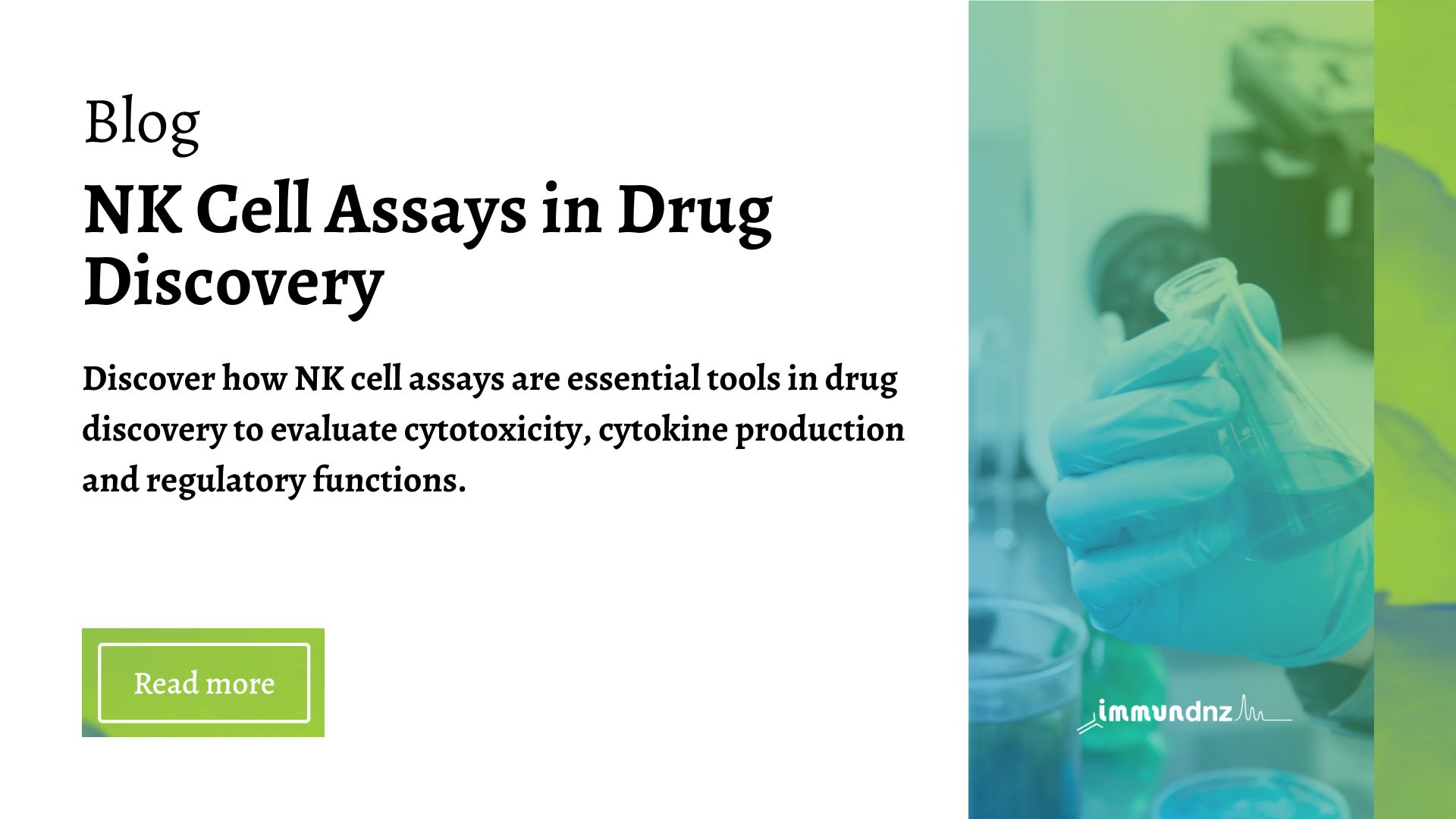Natural killer (NK) cells are innate immune cells with potent cytotoxic activity against infected and malignant cells, as well as regulatory functions in immune responses. NK cells play a crucial role in host defense against pathogens and surveillance against tumors. Harnessing their cytotoxic potential and regulatory capabilities has become a focus in drug discovery and development. NK cell assays are pivotal in elucidating NK cell biology, understanding their interactions with target cells, and screening potential therapeutic agents. The significance of NK cell assays in drug discovery, their applications, challenges, and recent advancements in this field will be explored here.
Understanding NK Cells
NK cells are a subset of lymphocytes that form a critical component of the innate immune system. Unlike T and B cells, which require antigen-specific recognition for activation, NK cells possess the ability to recognize and eliminate target cells without prior sensitization. They employ a repertoire of activating and inhibitory receptors to distinguish healthy cells from infected or transformed cells.
The cytotoxic activity of NK cells is mediated through the release of cytolytic granules containing perforin and granzymes, leading to target cell apoptosis. Additionally, NK cells produce cytokines such as interferon-gamma (IFN-γ) and tumor necrosis factor-alpha (TNF-α), which modulate immune responses and contribute to anti-tumor immunity.
NK cells also exhibit regulatory functions by interacting with other immune cells, including dendritic cells, macrophages, and T cells. Through cytokine production and direct cell-cell contact, NK cells can influence the activation, differentiation, and function of other immune cells, shaping the overall immune response.
NK Cell Assays in Drug Discovery
NK cell assays serve as essential tools in drug discovery and development, enabling researchers to evaluate the cytotoxic activity, cytokine production, and regulatory functions of NK cells in response to various stimuli. These assays can be applied across different stages of the drug development pipeline, from target identification and validation to preclinical and clinical evaluation.
One of the primary applications of NK cell assays is in immunotherapy, particularly in the development of NK cell-based therapies for cancer. Adoptive NK cell transfer, in which ex vivo expanded or genetically modified NK cells are infused into patients, holds promise as a novel cancer treatment approach. NK cell assays can be used to assess the cytotoxicity and cytokine production of these engineered NK cells against tumor targets, as well as their persistence and anti-tumor efficacy in vivo.
Furthermore, NK cell assays are instrumental in the screening of potential therapeutic agents that modulate NK cell function. Small molecules, antibodies, and biologics targeting NK cell receptors or signaling pathways can enhance NK cell activation, cytotoxicity, or regulatory functions. By evaluating the effects of these agents on NK cell activity in vitro, researchers can identify novel immunomodulators with the potential to enhance anti-tumor immunity or combat infectious diseases.
Moreover, NK cell assays play a crucial role in infectious disease research, particularly in the context of viral infections. NK cells are involved in the early control of viral replication and the clearance of infected cells through direct killing and cytokine-mediated mechanisms. Assessing the susceptibility of viral-infected cells to NK cell-mediated lysis and the ability of viruses to evade NK cell recognition provides insights into host-pathogen interactions and informs the development of antiviral therapies.
Challenges and Advancements
Despite their utility, NK cell assays present several challenges that must be addressed to enhance their reliability and relevance in drug discovery. One challenge is the heterogeneity of NK cell populations, which can influence assay outcomes and interpretation. Standardization of culture conditions, phenotypic markers, and functional readouts is essential to ensure consistency across experiments and facilitate comparisons between studies.
Another challenge is the complexity of NK cell interactions with target cells and the tumor microenvironment. High-throughput screening technologies and advanced imaging techniques offer promising approaches for dissecting these intricate networks and identifying novel drug targets. Additionally, the development of engineered NK cell platforms, such as chimeric antigen receptor (CAR) NK cells, has expanded the therapeutic potential of NK cell-based immunotherapy by enabling precise targeting of tumor antigens and enhancing NK cell-mediated cytotoxicity.
Advancements in single-cell analysis techniques have also revolutionized NK cell research, allowing for the characterization of NK cell heterogeneity and functional diversity at the single-cell level. These technologies provide insights into the dynamics of NK cell activation and regulation within complex immune microenvironments, informing the design of more effective immunotherapies.
Furthermore, the integration of computational modeling and artificial intelligence algorithms holds the potential to accelerate drug discovery by predicting the effects of candidate compounds on NK cell behavior and immune responses. By leveraging large-scale omics data and machine learning algorithms, researchers can identify molecular signatures associated with NK cell activation or dysfunction, facilitating the identification of novel drug targets and biomarkers.
Conclusion
NK cell assays represent indispensable tools in drug discovery, offering insights into NK cell biology, anti-tumor immunity, and host-pathogen interactions. By elucidating the complex interactions between NK cells and target cells, these assays enable researchers to identify novel immunomodulators, optimize NK cell-based therapies, and develop more effective treatments for cancer and infectious diseases. Despite challenges such as heterogeneity and complexity, ongoing advancements in technology and computational modeling hold the promise of overcoming these obstacles and unlocking new opportunities for leveraging NK cells in the fight against disease.


